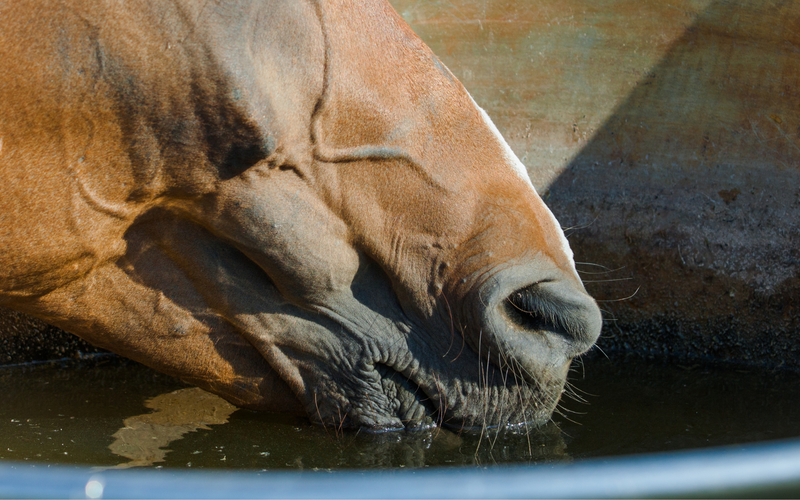
Horse hydration
Ask the expert
Equine vet Katie Brickman qualified from the Royal Veterinary College in London in 2013, and practises at Minster Equine Veterinary Clinic in York, specialising in sports horse lameness and poor performance.
Katie answers your questions on horse hydration:
Equine vet Katie Brickman qualified from the Royal Veterinary College in London in 2013, and practises at Minster Equine Veterinary Clinic in York, specialising in sports horse lameness and poor performance.
Katie answers your questions on horse hydration:
Q. How much is normal for a horse to drink?
An average, a 500kg horse will drink 30-50 litres of water a day. This amount can be dramatically increased if the horse is sweating as this uses up the water reserves in the body.
Did you know? Grazing reduces the horse’s need to drink pure water as the water content of grass is high - encouraging your horse to graze at an event can help them to re-hydrate.
Q: Before and after competition, should horses drink as much as they like?
A horse's access to water should never be restricted. On the way to a competition, the horse should be offered water every 2-3 hours. Once at the competition, the horse should continuously be offered water and forage and given time to relax before competing. Some people have reservations about giving the horse free access to water immediately after an event before the horse has chance to cool down. However, it has been demonstrated in scientific studies that horses will not drink beyond their stomach capacity in the first few minutes following intense exercise, hence they should be encouraged to drink as soon as possible following exertion.
Did you know? Water of an ambient temperature should be used if possible - it has been shown that horses prefer to drink water at a temperature of around 20°C.
Q. How can you tell if a horse is dehydrated?
Spotting a dehydrated horse can be very difficult and a horse can deteriorate quickly. Signs of dehydration include depression, lethargy, dullness, sunken eyes, cool extremities, decreased appetite, reduced urination and defecation, passing dark coloured urine, licking surfaces including licking or eating soil and abnormal drinking behaviour such as drinking for extended periods, taking long draughts or gulping water. On a basic level, even very mild dehydration will have an impact on the horse's performance. They cannot move as quickly, jump as high or engage their muscles as much with even slight levels of dehydration.
A crude measurement of dehydration in the horse is the ‘skin tent test’. In a normal horse if you pinch a piece of skin on the neck and pull it towards you it will spring back into place. In a dehydrated horse the skin will slowly fall back into place with no elasticity, but the test can be inaccurate so take care when interpreting the result. Additional signs which a vet will examine include increased heart and respiration rate, and pale and dry mucous membranes.
Did you know? The gold standard measurement of dehydration is a blood test to measure the level of proteins within the horse's plasma.
Q: If your horse is not drinking, when do you take action and what do you do?
Horses can be very fussy about the water they drink and the bucket they drink out of! Bring familiar water from home or mix the water with something tasty such as apple juice or sugarbeet water to make it more appetizing.
Did you know? Haylage has a higher water content than hay so introducing this to a horse’s diet could help their water intake.
Q. Why does a horse need electrolytes?
The main electrolytes lost through sweating are sodium, potassium and chloride. These are the key electrolytes the body needs to retain water so in order to keep the horse hydrated, they need these electrolytes as well as water. Ideally, electrolytes should be provided immediately after the horse has undergone a period of exertion, but in case the horse is fussy, ensure clean water with no added electrolytes is always provided alongside. A fussy horse may be tempted by giving electrolytes in a small amount of feed.
Commercially available electrolyte mixes (powders) give exact instructions on how to mix with water to achieve an isotonic solution. Take care when administering commercially available electrolyte pastes - there is a chance that a single large dose like this can actually worsen dehydration in the short term as they cause the horse to absorb water from the blood vessels surrounding the gut.
Did you know? Sodium chloride should be fed either from a salt block or by adding one tablespoon of salt daily to the feed.
Top Tip
Spray hay or haylage with water to increase the horse's water intake
First published in British Eventing Life magazine
